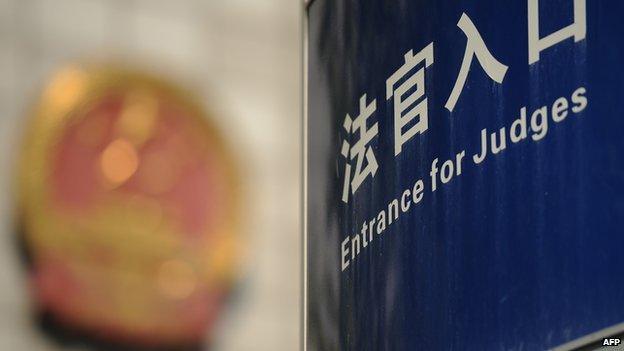China media: Death penalty
- Published

Chinese courts could soon see more crimes exempt from capital punishment
Media welcome a proposal by the Chinese authorities to abolish the death penalty for some crimes, saying it shows the country is moving away from capital punishment.
The standing committee of the National People's Congress (NPC), China's top legislature, is reviewing a draft law replacing the death penalty with life imprisonment for nine crimes, including illegal fundraising and smuggling weapons, the official news agency Xinhua reports.
Praising the move, an article in the Global Times, external says a "trend of reducing the use of the death penalty in China is clear".
It argues that while there is a "basic social consensus that China should not immediately abolish the death penalty", the country should "push toward this direction in a gradual way".
An editorial in the paper's Chinese edition, external concedes that the move has led to fears among online commentators that it may lead to more crime, but insists this is unjustified.
"This is only an impression that is not supported by statistics," the paper argues.
It adds that phasing out capital punishment is backed by a "social consensus" in China as well as a wider global tendency.
"This is a reform and we need to have the courage to move forward," it says. "It would be too timid of us if we were unable to catch up on this aspect of the law."
The Beijing News, external predicts that the death penalty will be abolished for further non-violent crimes.
"There are still 46 offences that are punishable by death," it says. "The abolition of the death penalty requires careful planning and China has a long way to go."
A legal expert interviewed by the Beijing Times says that the number of executions has already fallen to such a degree that capital punishment is effectively restricted to cases of murder, robbery and sexual assault.
Anti-terror centre
The NPC is also reportedly reviewing a draft law to set up a new anti-terrorism intelligence gathering centre.
According to the Global Times, external, the new body will "coordinate and streamline intelligence gathering in the field".
Pan Zhiping , a professor at Xinjiang University's Central Asia Research Centre, tells the South China Morning Post, external that China's "intelligence gathering is still lacking, and we need to do more work on that".
Reports that Vietnamese Prime Minister Nguyen Tan Dung is seeking Indian co-operation in oil exploration in the South China Sea have raised eyebrows in the Chinese press.
Several media outlets criticise Vietnam for "inconsistency" for making the apparent foray just as Chinese State Councillor Yang Jiechi arrived in Hanoi on Monday for talks to "push for further co-operation and properly manage maritime disputes", according to Xinhua, external.
Ties between China and Vietnam are strained by territorial disputes in the South China Sea.
Anti-China protests erupted in Vietnam in May after Beijing moved an oil rig into waters also claimed by Vietnam. China has since said it has removed the oil rig.
Mr Nguyen reportedly suggested during his visit to Delhi that Vietnam and India may join hands in oil exploration in the area.
An article in the overseas edition of the People's Daily, external criticises the move, and especially the fact that it coincided with Mr Yang's visit to Hanoi.
"Vietnam's conflicting actions show its government's inconsistency in dealing with Beijing over the South China Sea issue," it says, and chides Hanoi for "thinking that it can contain China with other big countries".
"Playing tricks will not solve the maritime disputes," the paper warns. "Instead it will hurt the relationship between Beijing and Hanoi and will even delay Vietnam's long-term development. It is time for Vietnam to show its sincerity."
An analyst tells the Shenzhen Satellite TV, external the incident is particularly painful after China showed "goodwill" to Vietnam by "retreating" from the oil rig".
"The oil rig is in Chinese territory, but China has taken the feelings of Vietnam into consideration.
"As such, Hanoi should sincerely respond to Beijing's goodwill through its actions," he argues. "Instead, it wants to bring India into the picture of territorial dispute."
BBC Monitoring, external reports and analyses news from TV, radio, web and print media around the world. For more reports from BBC Monitoring, click here. You can follow BBC Monitoring on Twitter, external and Facebook, external.